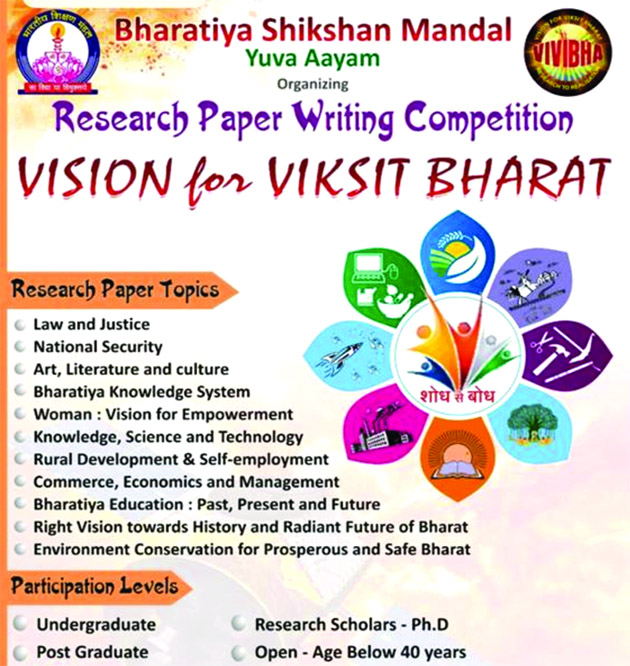Prof Vandana Sharma
As Bharat takes rapid strides to be a developed nation by 2047, this firm resolve involves participation of each and every responsible citizen who must be aware of what this vision of Prime Minster entails? Ostensibly, to transcend an epoch encapsulating the vision for Viksit Bharat ,the role of youth becomes imperative. We are a nation pulsating with energy and vitality with a staggering 65% of our population below the age of 35. Moreso, history is a witness to the glorious contributions of our youth, which has always played a key role in nation building – be it — the celebrated Chicago Address of Swami Vivekananda in the Parliament of World Religions in 1893 which received standing ovation; the nationalistic consciousness raising and sacrifices made by fiery freedom fighters during freedom struggle; the innate potential to rise above personal gains for the pride of nation and the upsurge of energy demonstrated by youth in the very recent Unicorn revolution in the country, the instances and examples galore. Admittedly, it goes without saying that our civilizational ethos has established that our youth possesses creativity, innovation, zeal and resilience. Now, the matter of concern today is not lack of competence or will to deliver but viewing and interpreting things from a western perspective, thereby, developing a lop-sided sceptical understanding of Indian knowledge traditions .
To comprehend the genesis of this crises, it is imperative to guage how systematically the agenda of colonial powers operated. Amidst the raging controversy between Orientalists and Anglicists, when Lord Macaulay came up with the Minutes on Education in 1835 which sought to establish the need for Indian ‘natives’ to receive an English education, only few discerning minds could foresee the long term consequences of Macaulay’s claim that English was the key to modern knowledge. Understandably, the British were working with the primary goal of Christianizing the ‘heathen’ natives and Macaulay’s justification, “a single shelf of a good European library was worth the whole native literature of India and Arabia” clearly exhibits the ploy and machinations of colonizers to establish the superiority of the Europeans. However, it cannot be denied that English later played a significant influence in India’s freedom movements and created the groundwork for modern education in our country. Nevertheless, Indians are still paying the price of this transition from the traditional indigenous educational system to a structured contemporary educational system, which is the ignorance of younger generations pertaining the enormous knowledge corpus and traditions of motherland.
The eurocentric colonial rulers who propagated that Bhartiyata lacks scientific temper and is modeled on superstitious approach was further strengthened by Eurocentric native rulers in post-Independent India. Balbir Punj in his well-researched and insightful book, Narrative ka Mayajaal convincingly argues that British studied the different dimensions of our country and identified seven-eight fault lines and this is how they devised the policy of divide and rule. We, as a society had many differences, but we knew how to live with them. However, British made us believe that we are obvious enemies if we think differently. Moreover, they came up with an academic paradigm to make different groups fight with each. Ostensibly, caught up in the labyrinthine of new academic paradigms, Indian Youth has grown confused about their own identity, their roots and either proudly embraces whatever comes from the West or clings to the divisive agenda and views their motherland with unjustifiable cynicism propagated by those who work with a mission to negate their glorious motherland. This disorientation and dispassionate detachment of Indian youth worries every discerning mind today. Therefore, the writer makes a humble advice to youth not to lose sight of our rich cultural heritage which is based on the principles of sustainability and the good for humanity.
As we embark upon our collective resolve towards Viksit Bharat @ 2047, it becomes imperative to enlighten youth about the relevance of conducting research rooted in local and Indian areas. An innovative initiative in this regard has been taken recently which is Research paper Writing Competition on Vision for Viksit Bharat which is open to any student below 40years age studying between undergraduate and doctorate. The selected researcher will get an opportunity to participate in the National level Researchers’ Conference being organised by Bhartiya Shikshan Mandal and will also get an opportunity to research in prestigious institutions. The themes for research paper writing encompass all disciplines which are, Law and Justice; National Security; Art, Literature and Culture; Bhartiya Knowledge System; Woman: Vision for Empowerment; Knowledge, Science and Technology; Rural Development and Self-employment, commerce, Economics and Management; Bhatiya Education: Past, Present and Future; Right Vision Towards History and Radiant Future of Bharat and Environment Conservation for Prosperous Bharat. Understandably, the researcher is expected to integrate her/his vision for Viksit Bharat with the chosen area by delving into Indian methods and theories and register on www.bsmbharat.org. before 30th June, 2024.
(The author is Dean, School of Languages, Central University of Jammu.)
Home Weekly specials Art World VIVIBHA -2024 Inviting Youth in Achieving the Vision for Viksit Bharat


